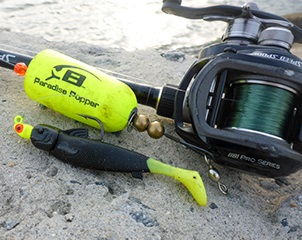 Every fisherman enjoys watching a float race out of sight. It’s one of the most iconic moments in fishing. When things get extra exciting, though, is when the float is the size of an extra-large egg, and the fish that yanks it under is a 2 ½-pound speckled trout or an 8-pound redfish!
Every fisherman enjoys watching a float race out of sight. It’s one of the most iconic moments in fishing. When things get extra exciting, though, is when the float is the size of an extra-large egg, and the fish that yanks it under is a 2 ½-pound speckled trout or an 8-pound redfish!
Conveniently, that’s apt to happen frequently when you use a Paradise Popper X-treme to present live bait or a soft-plastic lure during the fall. Like floats used for other kinds of fishing, a Paradise Popper adds casting weight, suspends offerings in the strike zone and lets you know when a fish bites. As importantly, though (if not more so), it calls in fish.
Pairs of plastic and glass beads rattle when you snap a Paradise Popper to resemble the clacking sound that shrimp make. Popper versions also pop or chug, which most likely suggests a feeding fish to a predator and prompts investigation. Some anglers favor the noisy Popper models. Others prefer the more subtle Oval Paradise Poppers.
Both shapes come in Orange, Pink and Yellow. Fishing guides sometimes mix of the colors on different anglers’ lines so they can distinguish which is which as they help clients by watching. Most individual anglers pick a color based on which they feel like they can see the best under various light conditions.
Rigging a Paradise Popper is simple. Tie your main line to the swivel at the top end of the wire that goes through the cork and a 3- or 4-foot section of leader to the swivel at the opposite end. Complete the rig with either a jighead or bait hook and a couple of large split shot. Good live bait options include shrimp, menhaden and mud minnows. If you prefer artificial lures, minnow or shrimp imitations, grubs and jerkbaits are all good options.
Working Paradise Popper rig is also simple. Make a long cast and let the rig rest for several seconds. If nothing hits, work the rig by alternating sharp snaps of the rod with pauses. Try single snaps and series of two or three snaps, and experiment with cadences and the sharpness of snaps.
Paradise Poppers become extra valuable along the South Atlantic and Gulf coasts during late fall and early winter, when trout and redfish feed aggressively in bays and tidal creek systems. Drift in areas where bait is plentiful or gamefish are breaking or work marsh edges or shell banks with the trolling motor running. Stay moving as you search for fish, but slow down when you catch one because where you catch one redfish or trout, you’ll often find several.
No matter how or where you fish a Paradise Popper, when it suddenly disappears or races sideways in shallow water, set the hook firmly and hold on tight!
